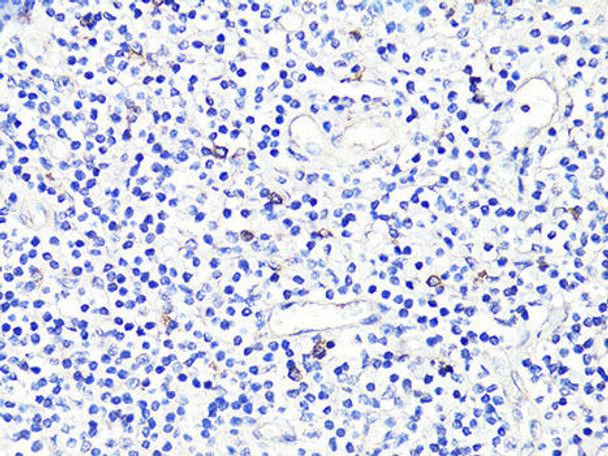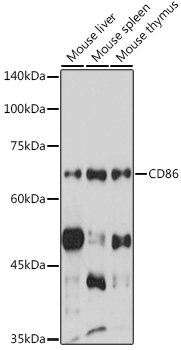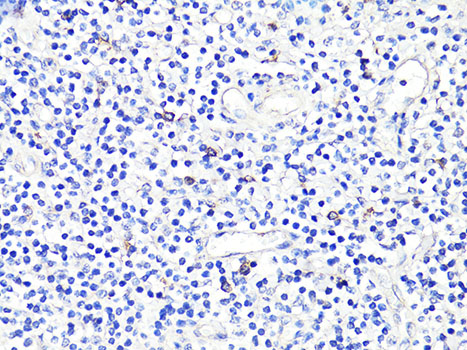Description
Anti-CD86 Antibody (CAB2353)
The CD86 Polyclonal Antibody (CAB2353) is a valuable tool for researchers studying CD86, a key cell surface protein involved in immune activation and co-stimulation. This antibody, generated in rabbits, shows high reactivity with human samples and has been validated for use in Western blot applications. By binding specifically to the CD86 protein, this antibody allows for the detection and analysis of CD86 expression in various cell types, making it ideal for research in immunology and autoimmune diseases.
CD86, also known as B7-2, is essential for T cell activation and the induction of immune responses. Its role in regulating immune function and promoting interactions between T cells and antigen-presenting cells makes it a crucial target for studies on immune modulation and therapeutic development. Research on CD86 is important for understanding diseases such as autoimmune disorders, infections, and cancer, where immune dysregulation plays a significant role in disease progression and treatment outcomes.
| Antibody Name: | Anti-CD86 Antibody |
| Antibody SKU: | CAB2353 |
| Antibody Size: | 20uL, 50uL, 100uL |
| Application: | WB IHC |
| Reactivity: | Human, Mouse, Rat |
| Host Species: | Rabbit |
| Immunogen: | Recombinant fusion protein containing a sequence corresponding to amino acids 30-247 of human CD86 (NP_787058.4). |
| Application: | WB IHC |
| Recommended Dilution: | WB 1:500 - 1:2000 IHC 1:50 - 1:200 |
| Reactivity: | Human, Mouse, Rat |
| Positive Samples: | Mouse liver, Mouse spleen, Mouse thymus |
| Immunogen: | Recombinant fusion protein containing a sequence corresponding to amino acids 30-247 of human CD86 (NP_787058.4). |
| Purification Method: | Affinity purification |
| Storage Buffer: | Store at -20'C. Avoid freeze / thaw cycles. Buffer: PBS with 0.02% sodium azide, 50% glycerol, pH7.3. |
| Isotype: | IgG |
| Sequence: | AYFN ETAD LPCQ FANS QNQS LSEL VVFW QDQE NLVL NEVY LGKE KFDS VHSK YMGR TSFD SDSW TLRL HNLQ IKDK GLYQ CIIH HKKP TGMI RIHQ MNSE LSVL ANFS QPEI VPIS NITE NVYI NLTC SSIH GYPE PKKM SVLL RTKN STIE YDGI MQKS QDNV TELY DVSI SLSV SFPD VTSN MTIF CILE TDKT RLLS SPFS IELE DPQP PPDH IP |
| Gene ID: | 942 |
| Uniprot: | P42081 |
| Cellular Location: | Cell membrane, Single-pass type I membrane protein |
| Calculated MW: | 12kDa/24kDa/28kDa/31kDa/37kDa |
| Observed MW: | 70KDa |
| Synonyms: | B7-2, B7.2, B70, CD28LG2, LAB72, CD86 |
| Background: | This gene encodes a type I membrane protein that is a member of the immunoglobulin superfamily. This protein is expressed by antigen-presenting cells, and it is the ligand for two proteins at the cell surface of T cells, CD28 antigen and cytotoxic T-lymphocyte-associated protein 4. Binding of this protein with CD28 antigen is a costimulatory signal for activation of the T-cell. Binding of this protein with cytotoxic T-lymphocyte-associated protein 4 negatively regulates T-cell activation and diminishes the immune response. Alternative splicing results in several transcript variants encoding different isoforms. |
| UniProt Protein Function: | CD86: Receptor involved in the costimulatory signal essential for T-lymphocyte proliferation and interleukin-2 production, by binding CD28 or CTLA-4. May play a critical role in the early events of T-cell activation and costimulation of naive T-cells, such as deciding between immunity and anergy that is made by T- cells within 24 hours after activation. Isoform 2 interferes with the formation of CD86 clusters, and thus acts as a negative regulator of T-cell activation. 4 isoforms of the human protein are produced by alternative splicing. |
| UniProt Protein Details: | Protein type:Immunoglobulin superfamily; Membrane protein, integral Chromosomal Location of Human Ortholog: 3q21 Cellular Component: cell surface; intracellular membrane-bound organelle; plasma membrane; integral to membrane; external side of plasma membrane Molecular Function:protein binding; coreceptor activity; receptor activity; receptor binding Biological Process: positive regulation of lymphotoxin A biosynthetic process; negative regulation of T cell anergy; T cell activation; viral reproduction; nerve growth factor receptor signaling pathway; positive regulation of transcription, DNA-dependent; positive regulation of interleukin-2 biosynthetic process; myeloid dendritic cell differentiation; positive regulation of activated T cell proliferation; positive regulation of interleukin-4 biosynthetic process; positive regulation of T-helper 2 cell differentiation; cell-cell signaling; T cell proliferation during immune response; positive regulation of cell proliferation; response to yeast; defense response to virus; aging; response to drug; epidermal growth factor receptor signaling pathway; fibroblast growth factor receptor signaling pathway; phosphoinositide-mediated signaling; B cell activation; T cell costimulation; toll-like receptor signaling pathway; innate immune response; immune response |
| NCBI Summary: | This gene encodes a type I membrane protein that is a member of the immunoglobulin superfamily. This protein is expressed by antigen-presenting cells, and it is the ligand for two proteins at the cell surface of T cells, CD28 antigen and cytotoxic T-lymphocyte-associated protein 4. Binding of this protein with CD28 antigen is a costimulatory signal for activation of the T-cell. Binding of this protein with cytotoxic T-lymphocyte-associated protein 4 negatively regulates T-cell activation and diminishes the immune response. Alternative splicing results in several transcript variants encoding different isoforms.[provided by RefSeq, May 2011] |
| UniProt Code: | P42081 |
| NCBI GenInfo Identifier: | 317373339 |
| NCBI Gene ID: | 942 |
| NCBI Accession: | P42081.2 |
| UniProt Secondary Accession: | P42081,Q13655, Q6FHB1, Q6GTS4, Q7M4L5, A0N0P0, B7Z2F3 B7Z702, E7ETN5, E9PC27, |
| UniProt Related Accession: | P42081 |
| Molecular Weight: | 329 |
| NCBI Full Name: | T-lymphocyte activation antigen CD86 |
| NCBI Synonym Full Names: | CD86 molecule |
| NCBI Official Symbol: | CD86 |
| NCBI Official Synonym Symbols: | B70; B7-2; B7.2; LAB72; CD28LG2 |
| NCBI Protein Information: | T-lymphocyte activation antigen CD86; BU63; FUN-1; CTLA-4 counter-receptor B7.2; B-lymphocyte activation antigen B7-2; CD86 antigen (CD28 antigen ligand 2, B7-2 antigen) |
| UniProt Protein Name: | T-lymphocyte activation antigen CD86 |
| UniProt Synonym Protein Names: | Activation B7-2 antigen; B70; BU63; CTLA-4 counter-receptor B7.2; FUN-1; CD_antigen: CD86 |
| UniProt Gene Name: | CD86 |
| UniProt Entry Name: | CD86_HUMAN |








![FITC Anti-Human CD86 Antibody [BU63] (AGEL0094) FITC Anti-Human CD86 Antibody [BU63] (AGEL0094)](https://cdn11.bigcommerce.com/s-h68l9z2lnx/images/stencil/590x590/products/20041/606386/fitc-anti-human-cd86-antibody-bu63-agel0094__64787.1707497828.jpg?c=2)
![APC Anti-Human CD86 Antibody [BU63] (AGEL0645) APC Anti-Human CD86 Antibody [BU63] (AGEL0645)](https://cdn11.bigcommerce.com/s-h68l9z2lnx/images/stencil/590x590/products/21176/605584/apc-anti-human-cd86-antibody-bu63-agel0645__76387.1707495310.jpg?c=2)
![FITC Anti-Human CD86 Antibody [IT2.2] (AGEL3389) FITC Anti-Human CD86 Antibody [IT2.2] (AGEL3389)](https://cdn11.bigcommerce.com/s-h68l9z2lnx/images/stencil/590x590/products/221510/605955/fitc-anti-human-cd86-antibody-it2.2-agel3389__02465.1707496505.jpg?c=2)
![Purified Anti-Mouse CD86 Antibody [GL-1] (AGEL0039) Purified Anti-Mouse CD86 Antibody [GL-1] (AGEL0039)](https://cdn11.bigcommerce.com/s-h68l9z2lnx/images/stencil/590x590/products/20010/605686/anti-mouse-cd86-antibody-gl-1-agel0039__79211.1707495657.jpg?c=2)
![FITC Anti-Mouse CD86 Antibody [GL-1] (AGEL0544) FITC Anti-Mouse CD86 Antibody [GL-1] (AGEL0544)](https://cdn11.bigcommerce.com/s-h68l9z2lnx/images/stencil/590x590/products/21075/606807/fitc-anti-mouse-cd86-antibody-gl-1-agel0544__64537.1707499154.jpg?c=2)